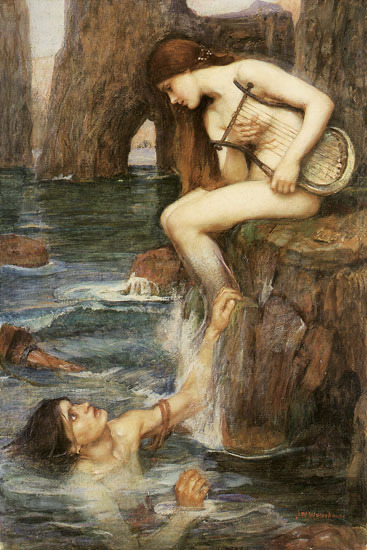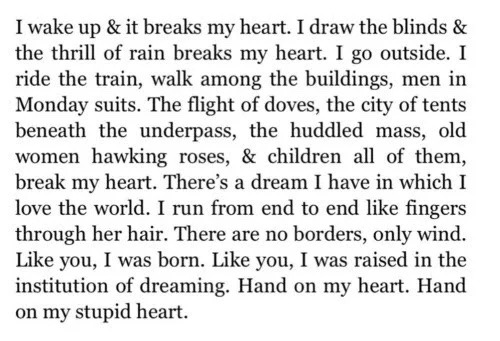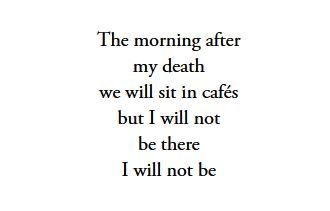“The Most Haunting Time At Which To See Them Is At The Turn Of The Moon, When They Utter Strange Wailing









“The most haunting time at which to see them is at the turn of the moon, when they utter strange wailing cries; but the lagoon is dangerous for mortals then…”
“the mermaids” - marianne boruch // “hylas and the nymphs” - john william waterhouse // “the love song of j. alfred prufrock” - t.s. eliot // “a mermaid” - john william waterhouse // “the siren” john william waterhouse // moby-dick - herman melville // “the knight and the mermaid” - isobel lilian gloag // “the land baby” - john collier // “lamia” - john keats // of “hylas and the water nymphs” - henrietta rae // peter pan // j.m. barrie
More Posts from Purposefullylackadaisical and Others
stealing this from twitter



Olena Kalytiak Davis, Shattered Sonnets, Love Cards, and Other Off and Back Handed Importunities

Sharon Olds, True Love

Stephen Crane, In The Desert

Cameron Awkward-Rich, Meditations in an Emergency
ANTIGONE: The fields were wet. They were waiting for something to happen. The whole world was breathless, waiting. I can’t tell you what a roaring noise I seemed to make alone on the road. It bothered me that whatever was waiting, wasn’t waiting for me.
Jean Anouilh, Antigone

Etel Adnan, The Spring Flowers Own & The Manifestations of the Voyage
I’m trying to give you everything I have. But I can’t find it; I can’t find it yet.
Alice Notley, In The Pines

Anne Carson, Plainwater: Essays and Poetry
& if I were to forgive you (& I know I could)
who would be left
who would be left
to forgive me?
Hieu Minh Nguyen, Afterwards

Mahmoud Darwish, Mural

Fariha Róisín, How to Cure a Ghost
“You kiss the back of my legs and I want to cry. Only / the sun has come this close, only the sun.”
Shauna Barbosa, GPS

Mahmoud Darwish, Mural

Forough Farrokhzad, Another Birth
repetition in poetry // part i
(part ii) (part iii) (part iv) (part v)
“Lily thought about Marilyn [Monroe]. Then she said, ‘It’s a funny thing about Marilyn. Nobody would be very happy if she were alive, except maybe me. You know how in the tabloids they’re always finding Elvis and JFK alive and living in South America or something? But they never find Marilyn, even though she’s just as famous. Well, they don’t find her, because they wouldn’t want to find her old.”
— Siri Hustvedt, The Enchantment of Lily Dahl
“In an experiment revealing the importance of having friendships, social psychologists have found that perceptions of task difficulty are significantly shaped by the proximity of a friend. In their experimental design, the researchers asked college students to stand at the base of a hill while carrying a weighted backpack and to estimate the steepness of a hill. Some participants stood next to close friends whom they had known a long time, some stood next to friends they had not known for long, and the rest stood alone during the exercise. The students who stood with friends gave significantly lower estimates of the steepness of the hill than those who stood alone. Furthermore, the longer the close friends had known each other, the less steep the hill appeared to the participants involved in the study. In other words, the world looks less difficult when standing next to a close friend.”
— my new favorite psychological study, done by Schnall, Harber, Stefanucci, and Proffitt and published in the Journal of Experimental Social Psychology.

Gillian Flynn, from Sharp Objects
what do you think drives lady macbeth's cruelty and do you sympathise with her at all?
This post and this post might be of interest. But I think ‘cruelty’ is the wrong word. Cruelty implies violence for the sake of violence and enjoyment of violence. (See here.) Lady M doesn’t revel in the violence. She doesn’t delight in it the way some of the characters in, say, Titus Andronicus do, or even Margaret in Henry VI does after the murder of Rutland/during the murder of York. For Lady M violence is always a means to an end. “Infirm of purpose” is what she calls her husband when he starts to get faint-hearted. He’s too full of the milk of human kindness “to catch the nearest way.” For her, it’s all about the outcome. The ends justify the means. Like I said in one of those posts, I think her driving force is ambition. She wants more than what she has.
Interestingly, she never expresses any personal desire to be queen. She does, however, use the singular possessive pronoun ‘my’ when she says “The raven himself is hoarse / That croaks the fatal entrance of Duncan / Under my battlements.” She claims the crime as her own, and even though the idea of murder occurs to her and her husband independently, she is the criminal mastermind. She says, “you shall put / This night’s great business into my dispatch; / Which shall to all our nights and days to come / Give solely sovereign sway and masterdom.” And at the end of the scene: “Leave all the rest to me.” This regicide is her baby–and I use that word very deliberately. There are a million possible explanations for why Lady Macbeth is so desperate to seize this power for her husband. My guess is it has something to do with that baby she mentions in 1.7 which doesn’t appear in the play. A woman’s function at this point in history was basically to be a baby-making machine and ensure the survival of her husband’s line. She hasn’t been able to do that (for whatever reason) and her husband, at least, is already middle-aged, so that procreation window is rapidly closing, if it’s not closed already. By early modern standards, that’s a huge dynastic failure. My guess is that her power-grabbing is about agency and compensation. Maybe she can’t continue Macbeth’s line, but she can make him king. And she does.
But here’s the other part of it which I think is really important and often gets overlooked, and it goes back to the fact that Lady M never expresses a personal desire to be queen. She wants her husband to be king, and she thinks he is fully deserving of that office. “Thou wouldst be great;” she says, “Art not without ambition, but without / The illness should attend it.” AND THIS IS SO KEY. Because Lady M is nothing if not full of ambition. What she’s saying here is “You don’t have enough darkness in your soul to do this, so I’m going to do it for you.” Now. Is that somewhat fucked up? Absolutely. However, that is an enormous sacrifice to make. I’m not going to get into this in depth, but there’s a lot of natural law theory floating around in this play. What’s important to know is this: In the protestant ethos of this play, if you commit regicide, you are 100% going to be damned for eternity. There’s no doubt about that. So, in an insane backwards way, this is actually an incredibly loving, selfless thing to do on Lady M’s part. She is willing to sacrifice her own salvation to make her husband king. Let that sink in. That is so much more hardcore than just saying, “I’d take a bullet for you, babe.” She is willing to burn for all time to put him on the throne, and not only is she willing, but it’s her idea, not just something she does with her back against the wall. That is a crazy kind of love. And that’s one of my favorite things about this play. This is not a unanimous opinion by any means, but I firmly believe that even though the Macbeths are terrible tyrannical people, they are desperately, devotedly in love with one another. Their language is incredibly intimate. In his first letter Macbeth addresses his wife as “My dearest partner of greatness,” and throughout the play they are constantly struggling to help and heal one another. Theirs is a relationship built on love and equality, whatever else they do (and however their relationship is also sometimes toxic and fractures through the play). Look at Macbeth’s conversation with the doctor in 5.3 when his wife’s health begins to fail: “If thou couldst, doctor, cast / The water of my land, find her disease, / And purge it to a sound and pristine health, / I would applaud thee to the very echo, / That should applaud again.” That. Is. Love.
So. Why does Lady Macbeth do the terrible things she does? There’s no certain answer. Ambition has a lot to do with it. But I think that ambition is rooted in guilt about what she hasn’t been able to provide her husband with, and a passionate yearning to make up for that, somehow. Leo’s character says in Inception that positive emotion trumps negative emotion every time, and I think that’s true here. Lady M doesn’t orchestrate Duncan’s murder because she’s inherently cruel. She does it for love.
The woman who eschews femininity, who is content with her natural shape and size and smell, who is impatient with the lengthy rituals of femininity, is condemned by both sexes. To women, she is an uncomfortable reminder of the extent to which they have abandoned themselves to the demands of men. To men, she is a threatening warning that their domination is not total and that women still have the power to regain themselves.
- Anne Summers, Damned Whores and God’s Police
Hi, could you please make a web weaving about the childhood that you know won't come back?

oumaima, I Will Be Leaving the Party Early

@traumacure (x)

Li-Young Lee, A Hymn to Childhood

Taylor Swift, Never Grow Up

Gregory Orr, Origin of the Marble Forest

Andy Muschietti directing It: Chapter Two (via)

Mitski, Two Slow Dancers

Adonis, Celebrating Childhood (trans. Khaled Mattawa)










thoughts on death and marriage and girls
(sophocles, antigone 891-4, c. 441 bce; ovid, metamorphoses x.1-7, 8 ce; phrasikleia kore inscription, 550-530 bce; euripides, iphigenia in aulis 1502-3, 405 bce)
inspired by @regenderate and @risissecupido and also joan breton connelly and nicole loraux
-
 islandinspace liked this · 4 months ago
islandinspace liked this · 4 months ago -
 izuku reblogged this · 9 months ago
izuku reblogged this · 9 months ago -
 rottengr69pes liked this · 1 year ago
rottengr69pes liked this · 1 year ago -
 vannhelsiing liked this · 1 year ago
vannhelsiing liked this · 1 year ago -
 theoriginaltraitor liked this · 1 year ago
theoriginaltraitor liked this · 1 year ago -
 fortunefool liked this · 1 year ago
fortunefool liked this · 1 year ago -
 purposefullylackadaisical reblogged this · 1 year ago
purposefullylackadaisical reblogged this · 1 year ago -
 evcrwoods reblogged this · 1 year ago
evcrwoods reblogged this · 1 year ago -
 evcrwoods liked this · 1 year ago
evcrwoods liked this · 1 year ago -
 ahsteriawrites liked this · 1 year ago
ahsteriawrites liked this · 1 year ago -
 vjctorian reblogged this · 1 year ago
vjctorian reblogged this · 1 year ago -
 draculas-bride liked this · 1 year ago
draculas-bride liked this · 1 year ago -
 dxrlingdoll reblogged this · 1 year ago
dxrlingdoll reblogged this · 1 year ago -
 outof1emons reblogged this · 1 year ago
outof1emons reblogged this · 1 year ago -
 outof1emons reblogged this · 1 year ago
outof1emons reblogged this · 1 year ago -
 halion-halion-aito liked this · 1 year ago
halion-halion-aito liked this · 1 year ago -
 jalakanyaka liked this · 1 year ago
jalakanyaka liked this · 1 year ago -
 mermaidsea-moved liked this · 2 years ago
mermaidsea-moved liked this · 2 years ago -
 pastel-twilights liked this · 2 years ago
pastel-twilights liked this · 2 years ago -
 queen-flou liked this · 2 years ago
queen-flou liked this · 2 years ago -
 darkpearleyes liked this · 2 years ago
darkpearleyes liked this · 2 years ago -
 arielle-elpis reblogged this · 2 years ago
arielle-elpis reblogged this · 2 years ago -
 arielle-elpis liked this · 2 years ago
arielle-elpis liked this · 2 years ago -
 oxfordsonnets liked this · 2 years ago
oxfordsonnets liked this · 2 years ago -
 thinkingofroses liked this · 2 years ago
thinkingofroses liked this · 2 years ago -
 christine-daee reblogged this · 2 years ago
christine-daee reblogged this · 2 years ago -
 manunkinda liked this · 2 years ago
manunkinda liked this · 2 years ago -
 lonelyaiko liked this · 2 years ago
lonelyaiko liked this · 2 years ago -
 bodilyform liked this · 2 years ago
bodilyform liked this · 2 years ago -
 mauvesockss liked this · 2 years ago
mauvesockss liked this · 2 years ago -
 lilacbookmark liked this · 2 years ago
lilacbookmark liked this · 2 years ago -
 hauntedbythenarrative reblogged this · 2 years ago
hauntedbythenarrative reblogged this · 2 years ago -
 eburneae reblogged this · 2 years ago
eburneae reblogged this · 2 years ago -
 stingray1961 liked this · 2 years ago
stingray1961 liked this · 2 years ago -
 acneedsart liked this · 2 years ago
acneedsart liked this · 2 years ago -
 pandorabox-rags liked this · 2 years ago
pandorabox-rags liked this · 2 years ago -
 elbisreverri liked this · 3 years ago
elbisreverri liked this · 3 years ago -
 anyastuffblog liked this · 3 years ago
anyastuffblog liked this · 3 years ago -
 realdefinitionofafallingstar liked this · 3 years ago
realdefinitionofafallingstar liked this · 3 years ago -
 1996joy liked this · 3 years ago
1996joy liked this · 3 years ago -
 sofipitch reblogged this · 3 years ago
sofipitch reblogged this · 3 years ago -
 crowned-ivy reblogged this · 3 years ago
crowned-ivy reblogged this · 3 years ago -
 schrodingersdragon liked this · 3 years ago
schrodingersdragon liked this · 3 years ago -
 crowned-ivy liked this · 3 years ago
crowned-ivy liked this · 3 years ago -
 finnitesimal liked this · 3 years ago
finnitesimal liked this · 3 years ago -
 mortytheestallion liked this · 3 years ago
mortytheestallion liked this · 3 years ago
95 posts